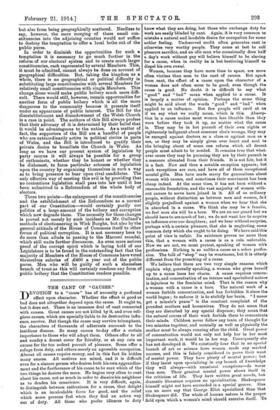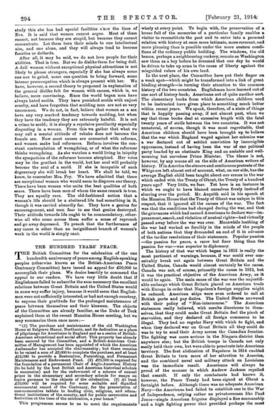THE CANT OF "CAUSES."
DEVOTION to a "cause" has of necessity a profound effect upon character. Whether the effect is good or bad does not altogether depend upon the cause. It ought to, but it does not. There is an immense deal of cant connected with causes. Great causes are not killed by it, and even reli- gions causes, which are speciallyliable to its destructive influ- ence, survive. But though the cause may survive triumphant, the characters of thousands of adherents succumb to the insidious disease. So many causes to-day offer a certain importance to those who will adopt them. Others offer to all and sundry a decent cover for frivolity, or at any rate an excuse for the too ardent pursuit of pleasure. Some offer a refuge from duty, and others merely an agreeable occupation. Almost all causes require money, and in this fact lie hidden many snares. All motives are mixed, and it is difficult even for a sincere person who desires both his own aggrandize- ment and the furtherance of his cause to be sure which of the two things he desires the more. He begins very often to cant about his cause, not so much in order to deceive his neighbour as to deaden his conscience. It is very difficult, again, to distinguish between enthusiasm for a cause, that delight which is an incalculable force for good, and the relief which some persona feel when they find an active way out of duty. All those who prefer idleness to duty know what they are doing, but those who exchange duty for work are easily blinded by cant. Again, it is very common to mistake a natural and laudable desire for occupation for some nobler feeling. Undeserved credit often generates cant in otherwise very worthy people. They come at last to call pleasure sacrifice, and an idle man who occasionally does half a day's work without pay will believe himself to be slaving for a cause, when in reality he is but bestirring himself to dispel his own ennui.
Women, because they have more time to spare, are more often victims than men to the cant of causes. But apart from cant, the effect of a cause upon the character of • woman does not often seem to be good, even though the cause is good. No doubt it is difficult to say what "good" and "had" mean when applied to a cause. It is largely a matter of opinion. Perhaps the some thing might be said about the words 'good" and " bad " when applied to an influence. But few people will cavil at us if we say what we really mean, which is this. Absorp- tion in a cause makes most women less likeable than they were before they took it up, no matter what the cause is. They may be in hot pursuit of their own rights or righteously indignant about someone else's wrongs, they may be enraged against doctors as a class or against men as • sex, or they may be simply given over heart and soul to the bringing about of some one reform which all decent people must admit to be needed. It remains true that what- ever cause they may be pureeing they are by their pursuit in a measure alienated from their friends. It is not fair, but it is a fact. Now and then a notable exception appears; but such exceptions are rare, and have all of them exceptional mental gifts. Men have made merry for generations about women with causes, and sometimes their merriment has been cheap indeed. At the same time, it has not been without a reasonable foundation, and the vast majority of women with- out causes to serve have joined in it. All of us ordinary people, without distinction as between men and women, feal slightly prejudiced against a woman when we hear that she is absorbed in a cause. We think she may be a fanatic, we feel sure she will be a bore. We are on our guard lest we should have to see much of her; we do not want her to acquire an influence over our daughters ; and we hear without surprise, perhaps with a certain pleasure, that she is neglecting some common duty which she ought to be doing. We have said this point of view is unfair. Its existence proves no more than this, that a woman with a cause Is as a rule unlovable. Now we are not, we most protest, speaking of women with professions. Nothing is so unlike a cause as a sober profes- sion. The talk of " shop " may be wearisome, but it is utterly different from the preaching of a cause.
We believe that there are two very simple reasons which explain why, generally speaking, a woman who gives herself up to a cause loses her charm. A cause requires concen- tration, and concentration of an intense and specialized nature is injurious to the feminine mind. That is the reason why a woman with a cause is a bore. The natural work of a woman forbids concentration, and has forbidden it since the world began; to enforce it is to stultify her brain. "I never get a minute's peace" is the constant complaint of the proudest mothers and housewives. They do not mean that they are disturbed by any special disputes; they mean that the natural course of their work forbids them to concentrate their minds. Children never follow any train of thought for two minutes together, and mentally as well as physically the mother must be always running after the child. Great power of concentration would not only not help her in her most important work, it would be in her way. Consequently she has not developed it. We constantly hear that in no special branch of art or science have women made any marked success, and this is falsely considered to prove their want of mental power. They have plenty of mental power; but
if they insist upon specializing in any branch of knowledge they will always—with unnatural exceptions—do worse than men. Their greatest mental power shows itself in
the criticiam of life. They have written great novels, but
dramatic literature requires no specialization. Shakespeare himself might not have succeeded in a special groove. One
can no more say that George Eliot specialized than that Shakespeare did. The whole of human nature is the proper field upon which a woman's mind should exercise itself. To
study this she has had special facilities eMce the time of Eve. It is said that women cannot argue. Most of them cannot, not because they are stupid, but because they cannot concentrate. Let them turn their minds to one intellectual aim, and one alone, and they will always tend to become fanatics or dullards.
After all, it may be said, we do not love people for their abilities. That is true. But we do dislike them for being dull. A dull woman without exceptional physical attractions is not likely to please strangers, especially if else has always some one axe to grind, some one question to bring forward, some intense preoccupation which is always present with her. We have, however, a second theory to propound in explanation of the general dislike felt for women with causes, which is, we believe, more convincing. Since the world began men have always hated scolds. They have punished scolds with unjust cruelty, and have forgotten that scolding men are not so very uncommon. We do not, in fact, believe that women as a sex have any very marked tendency towards scolding, but when they have the tendency they are extremely hateful. It is not a crime to scold; it is simply a repulsive peculiarity especially disgusting in a woman. From this we gather that what we may call a mental attitude of rebuke does not become the female sex. Now most causes are connected with reforms, and women make had reformers. Reform involves the con- stant contemplation of wrongdoing, or of what the reformer thinks wrongdoing. As she watches a world living in iniquity the sympathies of the reformer become atrophied. Her voice may be the gentlest in the world, but her soul will probably become the soul of a scold. If she is incapable of such degeneracy she will break her heart. We shall be told, we know, to remember Mrs. Fry. We have admitted that there are exceptional women who would seem to disprove our theory. There have been women who unite the beat qualities of both sexes. There have been men of whom the same remark is true. They are equally rare. The old-fashioned notion that a woman's life should be a sheltered life had something in it, though it was carried absurdly far. They have a genius for encouragement, and men fear to see that genius destroyed. Their attitude towards life ought to be commendatory, other- wise all who come across them suffer a sense of reproach and go away depressed. To preach that the furtherance of any cause is other than an insignificant branch of women's work in the world is simply cant.















































 Previous page
Previous page